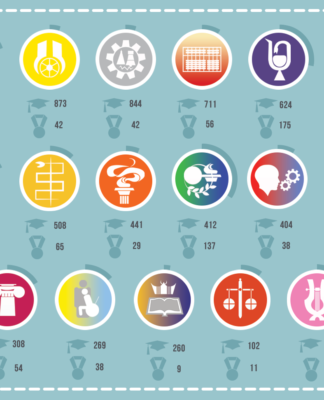BENEATH the canopy of stars and the first quarter moon, I pledged that “I am a Thomasian and will remain as one forever.”
With more than 5,000 other aspiring graduates as my witnesses, I know I am bound to fulfill my vow.
***
It felt strangely melancholic to be in the baccalaureate mass. A number of times, I had to purse my lips as I held back tears. I guess I still did not want to admit that time had gained on me again and four years were finally over.
It’s over. The days when I had to wake up at half past four in the morning just to catch up with my freshman Economics class at 7 am. The afternoons spent hanging out with friends at Robinson’s Place. The nights spent cramming with photocopied notes for the preliminary and final exams.
No more rejoicing for getting a flat one in English or moping for getting a three in Statistics. No more on-the-spot review for graded recitations, last-minute typing of required assignments, and sleeping with eyes open during dragging class lectures.
Finally, it’s over. No more caffeinated days of wrestling with the video documentary or the sleepless weeks of agonizing over the nerve-wracking thesis.
In a few weeks, I will officially exit the sheltered halls of learning of UST. Now, I’m off to the real, real world.
When I was in high school, many people warned me about the so-called real world of college. There would be more people, harder tasks, and bigger responsibilities to deal with, they said.
But after four years, I’ve realized that the real challenge lies beyond the campus, where your competence is put to the test. Will you descend to the ranks of the unemployed or will you go up the steps of the corporate ladder?
Finishing a four-year or five-year course comes with no guarantees that you would land a job that you studied for. Due to lack of job opportunities, some, if not most, people are forced to take menial jobs just so they would be employed.
Outside the University’s gates, there is no room for slackers and mediocre workers. If you want to stay employed, you have to make the big bosses need you more than you need them. Competition is fierce and work is fast-paced. The question remains: do you have what it takes to face the challenge?
I can’t exactly remember where I got it, but the words stuck to my head: “You fear that which you do not know.”
Yes, I am afraid of the future. School has been my comfort zone for 15 years and leaving it is like journeying to the unknown. I pride myself for being confident, but, sometimes, I ask myself, have I prepared enough? Do I measure up to the challenge?
A few weeks ago, a friend asked me, “Do you think we’ll get jobs right away after we graduate?” Without a moment’s hesitation, I answered yes. I blurted it out abruptly, perhaps, because I didn’t want to give myself a chance to consider otherwise.
Despite my uncertainty, I didn’t want to succumb to either fear or insecurity. I may not be able to control the forces in this world, but I control myself.
***
I am indebted to a philosopher-friend who taught me the difference between believing and knowing. To believe is to trust in something uncertain, to know is to be certain that something really is.
I don’t believe I can do it.
I know I can.















